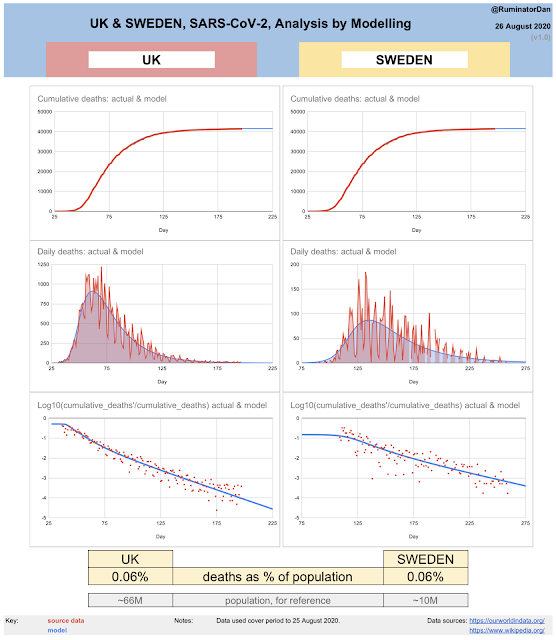Sweden & United Kingdom, SARS-CoV-2, an analysis & discussion
SWEDEN & UNITED KINGDOM,
SARS-CoV-2, AN ANALYSIS & DISCUSSION (v1.1):
SARS-CoV-2, AN ANALYSIS & DISCUSSION (v1.1):
[originally published as a Twitter thread, 27 Aug 2020]
Despite claims to the contrary the data are clear:
The outcomes for both countries have been remarkably similar.
This has happened in spite of the very different approaches taken.

Several people suspected months ago (I began in March) that, although SARS-CoV-2 was serious, the overall damage was probably overestimated. This post from May forecasts similar outcomes to what we now see.
from May 28,2020:
Sample model fits to data for UK, Italy & Sweden attached. Modelling suggests that the population fatality rates at saturation are all similar.
(Any errors my own.)

Yet the narrative says Sweden has "failed". It is true that everyone made mistakes, e.g. care homes, & there have been differences between Sweden & other Scandinavian countries.
However the overall outcome, as shown above, speaks for itself. Sweden & UK are very similar.
Crucially, framing the situation in terms of whether or not Sweden failed puts matters the wrong way round.
This paper,
https://journals.sagepub.com/doi/full/10.1177/0141076820945282
“Four months into the COVID-19 pandemic, Sweden’s prized herd immunity is nowhere in sight”
reported in the media,
https://www.bbc.co.uk/news/health-53741851
“Coronavirus: Exposure rate 'similar' in London and Stockholm”
finds similar seroprevalence levels in London & Stockholm.
The paper concludes that Sweden has therefore failed & that "Sweden's prized herd immunity is nowhere in sight".
In my view, this conclusion might be somewhat back to front.
To say that Sweden's approach has failed because it performed similarly to the UK seems an illogical interpretation. It appears to assume that the UK’s actions were more or less the default choice & also makes likely-incorrect assumptions about the virus (saturation levels etc).
We should not be measuring Sweden against the UK (& others) here. Since it is Sweden who took the more natural course, Sweden is the standard to which others should be compared; a control group. Consequently it is the UK that we should be measuring against Sweden.
A more logical interpretation of the data, therefore, is that the UK & many other countries, despite their well-intentioned but aggressive approaches, did not experience better outcomes than Sweden.
The UK's (& other's) actions appear not to have significantly diverted the virus from its natural course, as demonstrated by Sweden.
Further - and critical to the entire pandemic - fatalities have been approximately an order of magnitude lower than predicted.
_Notes_
1. UK was used here because of its inclusion in the articles mentioned. However, it is representative of many other countries.
2. I've written about modelling/analysis elsewhere, but have omitted to here in order to focus on the main issues (happy to discuss).
_Notes_
3. This version of the thread (v1.1) includes a correction to one of the charts in the first tweet (Sweden cumulative deaths). Many thanks to those who pointed out my error. The reminder of the thread is unchanged.
Despite claims to the contrary the data are clear:
The outcomes for both countries have been remarkably similar.
This has happened in spite of the very different approaches taken.

Several people suspected months ago (I began in March) that, although SARS-CoV-2 was serious, the overall damage was probably overestimated. This post from May forecasts similar outcomes to what we now see.
from May 28,2020:
Sample model fits to data for UK, Italy & Sweden attached. Modelling suggests that the population fatality rates at saturation are all similar.
(Any errors my own.)

Yet the narrative says Sweden has "failed". It is true that everyone made mistakes, e.g. care homes, & there have been differences between Sweden & other Scandinavian countries.
However the overall outcome, as shown above, speaks for itself. Sweden & UK are very similar.
Crucially, framing the situation in terms of whether or not Sweden failed puts matters the wrong way round.
This paper,
https://journals.sagepub.com/doi/full/10.1177/0141076820945282
“Four months into the COVID-19 pandemic, Sweden’s prized herd immunity is nowhere in sight”
reported in the media,
https://www.bbc.co.uk/news/health-53741851
“Coronavirus: Exposure rate 'similar' in London and Stockholm”
finds similar seroprevalence levels in London & Stockholm.
The paper concludes that Sweden has therefore failed & that "Sweden's prized herd immunity is nowhere in sight".
In my view, this conclusion might be somewhat back to front.
To say that Sweden's approach has failed because it performed similarly to the UK seems an illogical interpretation. It appears to assume that the UK’s actions were more or less the default choice & also makes likely-incorrect assumptions about the virus (saturation levels etc).
We should not be measuring Sweden against the UK (& others) here. Since it is Sweden who took the more natural course, Sweden is the standard to which others should be compared; a control group. Consequently it is the UK that we should be measuring against Sweden.
A more logical interpretation of the data, therefore, is that the UK & many other countries, despite their well-intentioned but aggressive approaches, did not experience better outcomes than Sweden.
The UK's (& other's) actions appear not to have significantly diverted the virus from its natural course, as demonstrated by Sweden.
Further - and critical to the entire pandemic - fatalities have been approximately an order of magnitude lower than predicted.
_Notes_
1. UK was used here because of its inclusion in the articles mentioned. However, it is representative of many other countries.
2. I've written about modelling/analysis elsewhere, but have omitted to here in order to focus on the main issues (happy to discuss).
_Notes_
3. This version of the thread (v1.1) includes a correction to one of the charts in the first tweet (Sweden cumulative deaths). Many thanks to those who pointed out my error. The reminder of the thread is unchanged.
@RuminatorDan
